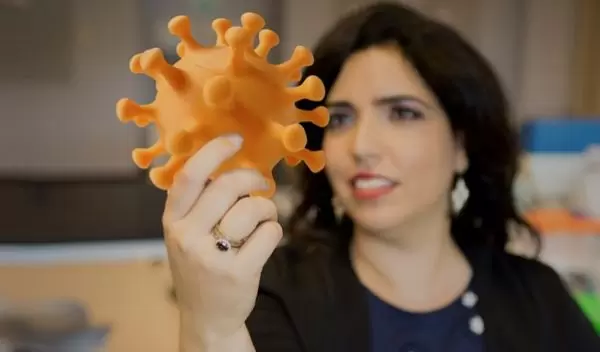
Sugar-coated strip advances COVID-19 testing
Researchers at the University of North Carolina at Chapel Hill and University of California San Diego are taking advantage of the coronavirus' sweet tooth in the design of a sugar-coated COVID-19 test strip effective at detecting known variants.
In the next few weeks, the U.S. National Science Foundation-funded scientists will determine if the self-test known as GlycoGrip can detect infections caused by the omicron variant, too.
"We have turned the tables on the virus by using the same sugar coat it uses to infect cells," said Carolina researcher Ronit Freeman, who published the findings in ACS Central Science.
The test is inspired by the biology of epithelial cells -- those targeted and infiltrated by SARS-CoV-2, the virus that causes COVID-19. These cells are coated with a dense matrix of sugars called the glycocalyx; it's this sugar net the virus exploits to cause infection.
In the test, a droplet of biofluid containing the virus, such as saliva, is placed on one end of a strip and flows along the surface. When the fluid reaches a sugar-coated patch, the virus indulges its sweet tooth, becoming trapped on that specific area.
This capture is then signaled by antibodies treated with gold nanoparticles, producing a visual color that indicates infection.
"We tapped into nature to reimagine viral diagnostics," said Freeman.
To better understand how these sugar polymers bind the virus, Freeman connected with Rommie Amaro, a biochemist at the University of California San Diego and co-corresponding study author.
Amaro and her team developed simulations that helped explain the mechanics behind how and why the cell-anchored sugars bind the viral spike protein, which the virus uses to infect host cells.
"We were able to identify key binding sites for the glycocalyx sugar polymers and unlock how these sugars adapt to different spike conformations," said Amaro. "We essentially revealed another secret of how spike binds cells to facilitate infection."
One of the greatest challenges of the ongoing COVID-19 pandemic has been responding to the virus' mutations and emerging variants. New tests must be developed for new tweaks in the virus' genetic code.
GlycoGrip offers a solution for universal coronavirus testing. "We are optimistic that GlycoGrip will capture future variants just as easily," Freeman said.
